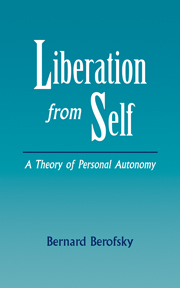Book contents
- Frontmatter
- Contents
- Liberation from self
- 1 Introduction
- 2 Freedom and autonomy
- 3 Freedom of action
- 4 Agent freedom
- 5 Values and the self
- 6 Autonomy and rationality
- 7 Rationality, values, and integrity
- 8 The liberation theory of autonomy: Objectivity
- 9 The liberation theory of autonomy: The place of self
- 10 The value of autonomy
- Notes
- Bibliography
- Index
6 - Autonomy and rationality
Published online by Cambridge University Press: 16 September 2009
- Frontmatter
- Contents
- Liberation from self
- 1 Introduction
- 2 Freedom and autonomy
- 3 Freedom of action
- 4 Agent freedom
- 5 Values and the self
- 6 Autonomy and rationality
- 7 Rationality, values, and integrity
- 8 The liberation theory of autonomy: Objectivity
- 9 The liberation theory of autonomy: The place of self
- 10 The value of autonomy
- Notes
- Bibliography
- Index
Summary
We have focused until now on the connections between freedom and autonomy. With respect to dispositional autonomy, I have insisted that an autonomous agent in a certain sphere must be a free agent, that is, she must possess (and be disposed to use) the tools of critical competence needed for the exercise of freedom of decision in that sphere. She exhibits autonomy of choice in a particular decision-making situation only if she is unhindered from without in the exercise of these capacities. She is fully autonomous if, once the decision is made, she is proficient at its enactment. Proficiency is constituted by power or token ability, a combination of positive and negative freedom. An agent may possess virtually full autonomy within a certain sphere if all the deliberations in that sphere result in autonomous decisions to perform certain actions which the agent is proficient at executing and which are relatively easy to perform – actions that do not demand heroic effort or the thwarting of contrary powerful impulses, moods, or general tendencies. The scope of autonomy of such an agent may or may not be extensive, depending upon the character of the items within this sphere. The scope is narrow, for example, if there are few items and they are trivial ones.
Information
- Type
- Chapter
- Information
- Liberation from SelfA Theory of Personal Autonomy, pp. 107 - 139Publisher: Cambridge University PressPrint publication year: 1995
